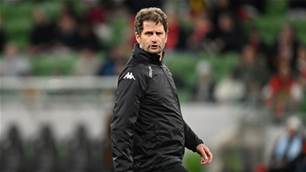Two out of two ain't bad. But perhaps it's not that great either. Or are our expectations too high? Lots of questions posed by the Matildas 1-0 win over Chile, here are some of our answers.
1. OUR FORMATION RESTRICTS OUR ATTACKING CAPACITY
Sam Kerr hit the nail on the head after the first Chile fixture, when she said that "we can play on the counter, but can we control the game and ball?"
Truth is, we have to choose which style we value more. Our formation relies heavily on our strengths: attacking fullbacks, technically strong wingers and a rapid forward line. All of which value pace among their strongest attributes.
It flows all the way through the team into the backline. Alanna Kennedy (who was sensational today), Clare Polkinghorne and Amy Harrison are all primarily ball players, renowned for their ability to deliver excellent defence-splitting passes.
It works in our favour defensively as well, where we press intelligently in the wide positions and often break up opposing attacks through back-tracking interceptions, allowing us to quickly springboard breaks when the opponent is caught mid-transition.
Against inexperienced opponents, like Chile, it also allows us to retain possession in the centre of the field. We build pressure, the opponent drops back and we can pass it side-to-side as much as we want, in the often beleaguered hope of wearing them down.
But under our current formation, that possession doesn't allow us to create attacking opportunities. We don't have a natural playmaker in a forward position, who holds, circulates and dictates tempo in our attacking third.
Our ability to break forward, but then cut back and still maintain pressure is barely evident. Ellie Carpenter and Steph Catley are obvious weapons, but our system only utilises them effectively when the game is played at a fast pace.
Otherwise, we've bombed all our players forward and now have to send the ball back into our defensive line just to retain possession. Likewise, the brilliant rapid interplay we began to develop in Milcic's first games in charge is also heavily restricted.
We can expect considerably worse against top-drawer opponents. We're easily outplayed in midfield and struggle carrying the ball out of defence if we're under any pressure.
Against a side with equal technical ability, a well-marshalled defence and a high-pressing game, we couldn't expect anywhere near the same level of control. So this lesson poses a question for Milicic.
You can't have it both ways, so which way do you want it?
2. ALL OUR EGGS ARE IN ONE BASKET
There's a habit in Australian sport to make your best player the captain. It stems from a time before globalisation and the 24-hour news cycle, when the incredible pressure involved in being an elite athlete was at least ocassionally escapable.
We saw with Steve Smith that this pressure takes its toll. We idolise our athletes and sporting mythology to such an extent that the need to win is ingrained into our sporting ethos from an early age.
As a captain, you bare the brunt of this. Now we're not saying that Kerr shouldn't be the Matildas' captain. She's clearly the face of the Matildas regardless and she wears her heart on her sleeve, a trait that enables her to speak the tough truths when the rest of the team need to hear them.
But our reliance on Kerr is beginning to edge into dangerous territory. She's not just the face of Australian football, she's the best player in the Matildas (and one of the best in the world) by some margin.
She's also the captain at 26-years-old and our principal goal threat, a player who spends the majority of her time outside of the general match rhythm, whom we rely on in every game she plays to make the difference.
She's also one our most key defensive assets from set pieces, her physicality and heading ability separating her from many of her teammates. Her physicality is a point as well. Is a player so naturally aggressive and physical the one to always ensure cool heads prevail?
And just in case that wasn't enough, she's also our penalty taker? She has a mixed record from the spot, so if you're looking towards the future and trying to share some of the load among the team, this is the key place to begin.
But the question needs to be asked, whether we can sustainably place all of our hopes on one player's shoulder like this going forward. If you look around the best football teams in the world, the majority don't have their best player as captain. Often, it's one of the least notable players in the team.
Making one of the midfield generals or experienced defensive stalwarts captain - one of the least flashy players on the pitch - re-defines what's valued in the team. It sends a clear message that the team is a unit, individual and equally valued parts of a whole.
It's easy to see why, in a team still to some extent reeling from the fragmentation posed by the Stajcic sacking, the easy decision to make Kerr captain was the right one. Hopefully she can continue to grow into the role, despite the ever-increasing pressures at club and national level.
But in a team that possesses a wealth of talent, yet seems to be beginning to search for other players to take that step up, it might be worth considering other options under Milicic's replacement.
3. THERE ARE NO EASY BEATS ANYMORE
World rankings are becoming increasingly fragile representations in the women's game, due to the rapid rate of development across female football.
It means that when we adjudicate a defensive performance, it's hard to tell whether the world number 37 ranked Chileans are broadly representative of what we'll face in the future, or perhaps letting us off the hook.
It should be remembered, this is a team that had already played four undefeated matches since the World Cup. So how can we judge two narrow victories?
At best, set pieces are a significant weakness in this team. When you're relying on your star striker to make defensive clearances and parking 11 behind the ball from free kicks, you know you're in trouble.
It stems from our that lack of physicality that's beginning to become a bug-bear for us. Players like Jenna McCormick make a significant difference, but they can't be the sole solution.
There has to be a long look in the way we organise our positioning, Lydia Williams' role in marshalling these players and coming out for balls close to her area, and in general at our fragility in this area.
At worst however, our midfielders and defenders seem a little off the pace. Too hesitant to press at the right times, awkward from clearances - largely a product of formation - and once again, tepid when attempting to play the ball out from the back.
That said, two wins out of two ain't bad. These were our first matches since a very mixed World Cup and all the drama that preceded it. The last 12 months have been a character-building exercise for a team still adjusting to their place among the world's best.
Now, they just have to adjust to the fact that the rest of the world is quickly catching up.
Related Articles

'Timing not right': Montemurro's verdict on Matildas vacancy

Matildas: 'Fourth at the Olympics is honestly the worst place you could come'
.jpg&h=172&w=306&c=1&s=1)













